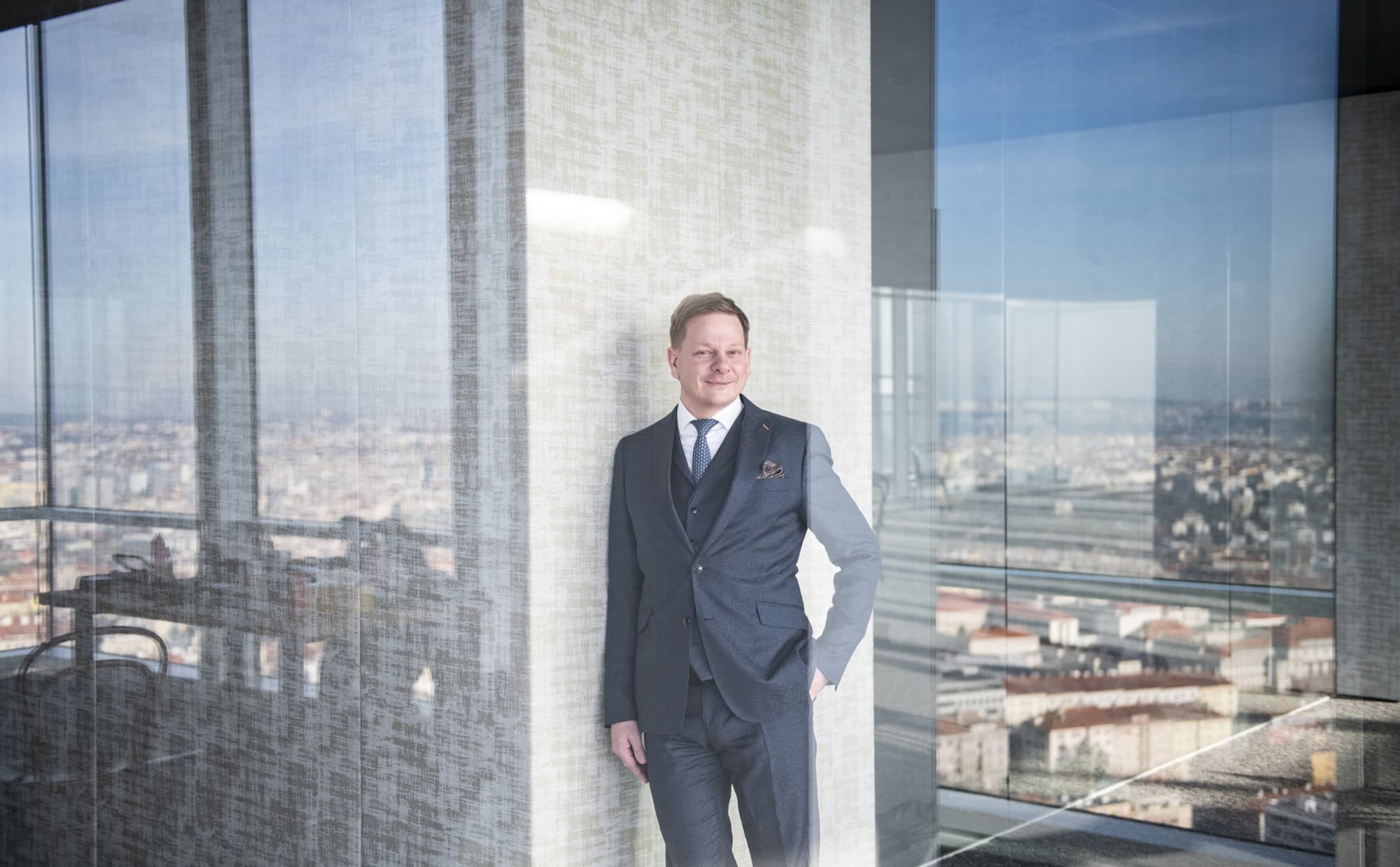No one has yet convinced me that the added value from business is created in pedestrian zones.
06 \ 05 \ 2025

The capital should tender for someone to coordinate the planning and construction of the D metro, says Petr Michal, head of the Prague Chamber of Commerce. According to him, there are beautiful plans in Prague, but the implementation almost always loses the ball. One of the reasons for this is the complexity of what is actually in whose competence.
What is the number one topic for you as the head of the Prague Chamber of Commerce?
Petr Michal In Prague, our clear priority is to make public space and the functioning of public administration more transparent. When I get off the tram at Charles Square and look around, I have no idea which phenomena are the responsibility of the city, what is the responsibility of the municipal district and what is the responsibility of the state. In this opacity, which is difficult even for politicians, any traction is completely lost. Whether it is, for example, the ring road, Metro D or anything else. We have a large, even hypertrophied, part of planning and strategising. Which is not a bad thing, because, for example, IPR does some really beautiful things. But the implementation is very slow, even moribund. And that fragmentation is not conducive to any kind of acceleration.
Can you give an example?
Around two years ago, at a seminar on transport, the question was raised about what was happening to part of the urban ring road in and around Libeň. The answer was that the project had been redesigned and was still being worked on, and that planning permission would soon be applied for. This means that studies were being carried out and changes were being made, but then it turned out that nobody had dealt with project management. The environmental impact assessment is only valid until mid-2027, so they have to get a final building permit before then. But to apply, you need a completed project, which doesn't exist. It is not possible to select a designer in a public tender without committing an offence. At the same time, the ring road will enable the development of places such as Malešice with its many industrial buildings.
What can the Chamber do to improve it?
We should also take some responsibility and I will explain why. Many things are hidden in a fog that no one tries to dispel. That is why we should pressure politicians and the municipality to tell us what they are working on and what they are doing. In this way we should fight the opacity and impermeability of the system.
Are there positive exceptions?
In Prague, we are facing major investments by the Railway Administration. Next up is the Road and Motorway Directorate. The outer ring road project is finally getting off the ground, in my opinion because under the leadership of the current director, Radek Mátl, the organisation has been given some impetus and has started to function. The delays between the parts that have been put into operation so far have been about fifteen years, but now things are finally starting to move again. However, I would like Prague not to be the recipient of what comes from above, but to be the initiator. On the other hand, more state involvement in some investments would not hurt. Because this is a benefit for the whole republic. If the state is planning a new runway at the airport, the city has an interest in its expansion. The state, in turn, should have an interest in the development of its capital city.
Is this specific to Prague?
I think there are many decision-making processes in Prague that are more complicated than elsewhere in the Czech Republic. Finding a unifying consensus is certainly more challenging here. My personal impression of Brno, for example, is that it is being built like a race, with the city itself being a major investor. In Prague, on the other hand, I think there is less work on many things than before. On the other hand, the state of public transport here is positive. Because the transport company not only runs it, but also owns the infrastructure. Thanks to this, it is expanding it organically and the whole thing is working very well. This model is unique in the Czech Republic, usually the transport company is the transport operator and the city is the owner of the infrastructure.
So what should the city do to speed up the implementation of projects?
Certainly create a task force for each of them. I estimate that there are at most less than a dozen people working on the construction of the D line of the Prague metro. They are located in the transport company rather than in the city, which is the investor.
You mentioned the outer ring road. How is it important to you as an entrepreneur?
First of all, it is an example of how such investments work. But at the same time, I cannot change things inside the city unless I have sorted out the diversion of traffic outside the city. I can't plan the inside if I'm still planning the outside communication system, not implementing it. Not to mention that transit traffic is taking up time in Prague and destroying city property.
But when we compare the pace of implementation with other countries, the issue of regulations and regulation cannot be overlooked.
I am firmly convinced that all permitting processes were created in response to a social need. They are there to protect some interests and values. It is right if we want some minimum technical standards for buildings. But it is also the task of the political representation to seek a social consensus on what is desirable and what is not. If there is a consensus in Prague that we should all ride our bikes, that will be fine. But I don't think there is. The way I see it, we want to do business, live nicely, and basically drive cars. The places where we can't do that, life disappears. No one has yet convinced me that the value added from business is created in pedestrianised areas.
But hasn't regulation matured to the point where it is already holding back development?
Yes, it's hypertrophied. But then again, that's the job of local government to work to create that social consensus and enforce it instead of unnecessarily. It works much better at the borough level. Maybe it is because at the city level the results of investments and changes are only visible in the longer term. Whereas districts respond to obvious current needs.
Are we too critical of the way Prague works? We say that transport to the airport is tragic, but is it better in Paris?
I think you are right, and at the same time I profoundly disagree with you. It is true that if you get off at Charles de Gaulle airport and take standard public transport, it is purgatory. But I do not agree with the argument that because it is worse elsewhere, it is fine here. We're in Prague precisely because it's a good place to live. We owe it to our ancestors and we should therefore establish something for our children.
Take the metro D. It's supposed to serve the housing estates of Lhotka, Kamýk, Libuš and Písnice. This area is accessible by five roads and the Kunratická spojka. Yet 80,000 people live there. So there can be no doubt about the need to connect this area to high-capacity rail transport. The problem is the state of the project. Which I am not saying as a criticism of the city, but as a statement of fact. The subway is being built by the transit company, but they have to get all the funding from the city. Therefore, I think the city should bid out someone to coordinate the planning and construction. For now, it is in the clinch of potential contractors fighting each other, and a delay of two or three years is probably inevitable. Yet the metro has been built continuously in Prague since 1975 and its expansion has never stopped, which is now imminent.
And does Prague really need a rapid transit line to the airport?
First of all, it would be desirable if we forgot the word rapid transit. It has done the whole thing a terrible disservice, because the local areas through which it is to run do not like it. At the same time, trains are supposed to run at around 80 kilometres per hour on this line. Today, we have around eighteen million passengers a year at Ruzyně Airport, and we are probably at maximum capacity. Of course, we want to increase this, and we are talking about a huge number of business opportunities and growth. Vienna has about 32 million passengers a year. If Prague Airport were to reach these numbers, it would need a new runway and better transport to the city centre. In high season, for example, there could be four million passengers a month, and we simply cannot get them to Veleslavin by trolleybus.
The lack of growth is evident in practice. We had a global pharmaceutical company based in Switzerland that wanted to relocate about fifty managers to Prague. But they couldn't find housing and were bothered by the lack of air links. If politicians are going to talk about hi-tech and startup firms, they need to attract companies like this. And for that you need infrastructure. There's no debating that.
More on the website [e15]




